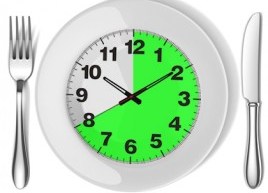Intermittent fasting is a different way of thinking about eating.
I’m suggesting that the majority of people have been eating too much and too often. I’m suggesting that breakfast is not the most important meal of the day. By following a few simple guidelines my readers can loose weight, feel great and be healthier than ever before. The guidelines are:
- “6 to 8 and feel great”
- “Eat what you need”
- “Respect your food, respect yourself”
6 to 8 and feel great
Everyday eat within a 6 to 8 hour time frame. If you eat breakfast at 7:00am then your last meal of the day should not be later than 3:00pm. If you eat lunch at 12:00pm then your next and last meal should be no later than 8:00pm. In the first scenario you are basically skipping dinner and in the second scenario you are skipping breakfast. Water, tea, and even coffee are allowed outside of the 6-8 hour allotted time frame as long as there is no added calories, i.e. sugar, milk and or cream. There is also no snacking outside of your 6-8 hour window.
Now let me tell you why and how intermittent fasting works. Immediately after eating, a hormone in your body called insulin rises. Insulin tells your body to burn carbohydrates (sugar) for energy and to store whatever hasn’t been used in your liver and fat cells. This process continues for approximately 4 hours after eating. After 4 hours insulin drops and your body begins to dip into stored sugar and fat reserves for energy; or in other words that’s when you start burning fat.
It’s common practice for most people to eat 3 times a day with snacks in between, this means that we almost never dip into our fat stores. Therefore you would have to do some intensive daily exercise or eat incredibly small portions to loose weight. By following the 6-8 rule; you can almost be certain that you will be burning fat for approximately 10-12 hours per day. The only thing keeping you from shedding excess pounds is by being excessive with portion size and calorie intake, which brings us to the next guideline “eat what you need”.
Eat what you need
This guideline basically translates to portion control. One advantage about using the 6-8 methodology is that you will start becoming more in tune with your body and more aware of hunger and satiety. It is a great feeling to eat when you are actually hungry rather than out of habit. When we experience hunger, food is digested better. Hunger causes your gastrointestinal tract to prepare for food, including ample amounts of stomach acid aiding in the proper breakdown and absorption of nutrients.
Pay close attention to the point at which you no longer feel hunger and you are adequately satiated. Do not overeat. Eat to a point that you feel satisfied but not heavy and bloated. You may notice that portion sizes become smaller. Now, because we are eating only two meals per day, it is also important that when we eat, we eat nutritious food and a variety of foods. Which brings us to the next guideline.
Respect your food; respect yourself
This guideline is about what kind of food you eat and how you eat it. As mentioned in the previous section, since we are essentially eating only twice per day, we want to be putting high quality foods into our body. Fresh, local and organic foods are what you want to focus on. The great thing about this diet is that it there are no restrictions on foods, it’s more about quality. Try to have meals that have a good quality protein, and complex carbohydrates such as veggies and whole-grains.
While making healthy choices is very important, it is also just as important not to stress over your food. Do your best to cook healthy while acknowledging that sometimes you will find yourself eating out, ordering fast food, and having desserts. Don’t beat yourself up about the choices you make, love whatever it is your eating, own it and do your best to eat healthy most of the time. Love your food and love yourself.
Final Thoughts
The guidelines I have purposed, although expressed in an original way, are not new concepts. Eating within a 6-8 hour window is also known as intermittent fasting; a lifestyle and medical intervention that shown to have a multitude of health benefits including lowering blood pressure, staving off cardiovascular disease and improving longevity. Presenting these ideas in away that is easy to incorporate into a daily routine can help to improve the lives of many people. I encourage you to try it out, give it a few weeks and let me know how you feel.
Fitness trainer Mike O’Donnell (2 meal mike) does a great job of further explaining intermittent fasting and how to easily incorporate it into your daily routine. I encourage you to visit his site http://www.theiflife.com



